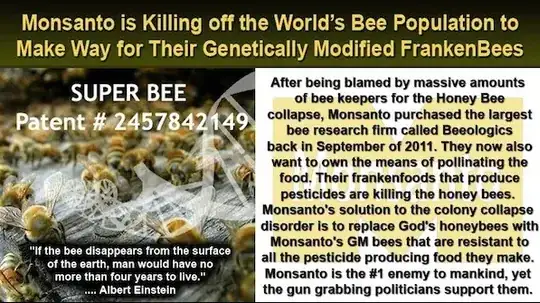In 2011, Monsanto acquired a company specialised in bees. Claims are circulating on the internet about an alleged Monsanto bee patent. In its most radical form, the claim is:

Monsanto is killing off the world's bee population to make way for their genetically modified frankenbees
After being blamed by massive amounts of bee keepers for the Honey Bee collapse, Monsanto purchased the largest bee research firm called Beeologics back in September of 2011. They now also want to own the means of pollinating the food. Their frankenfoods that produce pesticides are killing the honey bees. Monsanto's solution to the colony collapse disorder is to replace God's honeybees with Monsanto's GM bees that are resistant to all the pesticide producing food they make. Monsanto is the #1 enemy to mankind, yet the gun grabbing politicians support them.
Now this contains a number of allegations and claims, some quite wild, but it contains some truths if other sources are to be trusted. To quote a source that appears more reliable, although not objective, investigative journalist Maryam Henein writes:
Considering that the honey bee genome has been sequenced, how long before we bear witness to a genetically modified bee? If seeds are any indication, Apis melifera may also soon belong to Monsanto. Kill the bees with GMO plants and pesticides, offer a band-aid solution by creating a bee that is resistant to all the crap peddled on the market and then “persuade” beekeepers to buy Monsanto bees or else. It’s wicked genius.
But I am sure Monsanto and many others would call all of this paranoid phooey. Take one well known scientist and beekeeper’s opinion on the subject: “Honeybees aren’t an organism that anyone who understands anything about their molecular biology would advise as a subject for genetic modification,” he recently told colleagues on the online Bee List. “Do you really think that Monsanto envisions that there would be any substantive return on investment on a patented bee?”
Personally, I certainly don't trust information coming straight from Monsanto. However, information from GMO-critical activists has also been mixing facts with semi-truths and disinformation. Googling for patent 2457842149 is not very helpful.
Is there a "bee patent"? If yes, what does this mean? If no, is there any truth is the story by Maryam Henein?